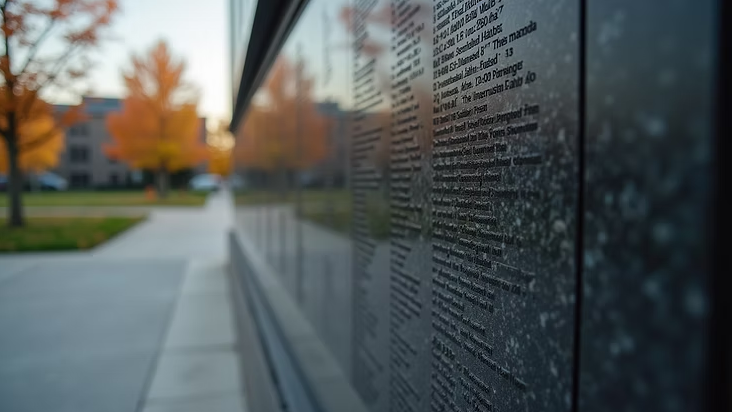
Honoring Our Heroes: The Importance of Memorials
Share
In every community, there are individuals whose bravery and commitment keep us safe. We often refer to these individuals as heroes. When they make the ultimate sacrifice in the line of duty, it is crucial to honor their memory through memorials. These sites serve as a reflection of our gratitude and offer a place of remembrance for families, friends, and the community as a whole.
The Role of Memorials in Honoring Fallen Officers
Memorials are more than just physical structures; they are significant spaces where the sacrifices made by our heroes are acknowledged. From police stations to public squares, these memorials provide a gathering place for remembrance and reflection.
They can take many forms. Some are grand monuments, while others may be simple plaques. Regardless of their design, these memorials serve a critical role: they preserve the stories of fallen officers and remind us of the dangers they faced while serving their communities.

Memorials also create awareness about the risks that officers face daily. They remind us that behind every badge is a person dedicated to protecting others. Without memorials, the stories of these heroes might fade into obscurity, depriving us of the lessons and histories that they represent.
The Impact on Families and Communities
When an officer loses their life in the line of duty, the impact reverberates through their family and the entire community. Memorials provide a space for families to grieve and honor their loved ones. They bring together people who may not know each other but share a common bond through loss.
For many families, having a designated place to visit can be a source of comfort. They can celebrate the life and accomplishments of the fallen officer. Each year on memorial days, families and community members gather at these sites to pay their respects, ensuring that their sacrifices are not forgotten.
Moreover, memorials often serve as locations for annual ceremonies and events that honor the legacies of those who have died in the line of duty. These gatherings provide an opportunity for community members to unite, reinforcing bonds and fostering a sense of collective responsibility to support the families of the fallen.

The presence of a memorial can also evoke discussions about safety, policy changes, and the importance of mental health support for current officers. When communities prioritize honoring their fallen heroes, they also reflect on how to improve safety measures for those still serving.
How Many Officers Are Killed in the Line of Duty?
Understanding the statistics surrounding officer fatalities can deepen our appreciation for the significance of memorials. Each year, numerous officers across the globe lose their lives while protecting the public. The numbers can vary, but every fallen officer represents a loss that is deeply felt by their families and communities.
In the United States alone, there have been strides to track these instances accurately. Organizations like the National Law Enforcement Officers Memorial Fund report that hundreds of officers have died in the line of duty annually, with specific years seeing devastating spikes due to various factors like violent crime, traffic accidents, and other hazards associated with law enforcement.
As of the last decade, certain years have shown increases in the tragic reality of line of duty deaths. For example, the figures reported indicate that the year 2021 alone had 458 documented fatalities. Each number is not just data; it signifies a life dedicated to service and a family that bears the burden of loss.

These statistics highlight the importance of ongoing discussions and efforts to enhance police safety. Memorials serve as constant reminders that we must continue to aid those who protect us, ensuring that we advocate for their health, safety, and well-being in every aspect.
Education and Awareness
Memorials are also pivotal in raising awareness about the dangers that officers face. They serve an educational purpose by informing the public and fostering dialogue about the challenges that law enforcement encounters. Educational programs are often hosted at these memorials, aimed at engaging community members through workshops and events.
Providing children and young adults with insight into the realities of law enforcement can inspire future generations. Programs focusing on local heroes and their sacrifices can shape public perception and encourage respect for those in service. This education can create goodwill, as people learn more about the realities of working in law enforcement, paving the way for community collaboration.
The media can play a significant role in promoting these narratives and emphasizing the importance of memorials. Stories about fallen officers can invoke emotions and drive home the value of public safety, which often doesn’t receive the spotlight it deserves.
Continuing the Legacy
Honoring fallen officers through memorials is just the beginning. The real legacy lies in how we continue to support and uplift current law enforcement personnel and their families. Communities should actively participate in initiatives that promote mental health, wellness programs, and community-police relationships.
Encouraging public forums where officers can share their experiences and challenges fosters transparency and trust. This sharing helps demystify law enforcement careers and can help bridge gaps between communities and the police.
Moreover, establishing scholarships and initiatives in the names of fallen officers can further their legacies. Investing in education and opportunities for youth in the community keeps their memory alive while serving a greater purpose.
Incorporating wellness programs geared toward first responders can significantly impact, helping officers navigate the emotional toll of their jobs and the memories of their fallen colleagues.
The importance of memorials extends beyond remembrance; it's a call to action for communities to honor fallen officers by improving the environment in which current officers work.
By creating a culture of appreciation, respect, and understanding, we can ensure that the heroes who sacrifice so much for our safety are remembered not only through memorials but also in our actions.
Memorials are a vital aspect of honoring fallen officers. They remind us of the sacrifices made for the safety of our communities, urging us to reflect on the realities of police service. Through education, awareness, and community support, we can pay tribute to these heroes effectively, ensuring that their sacrifices are never forgotten.
